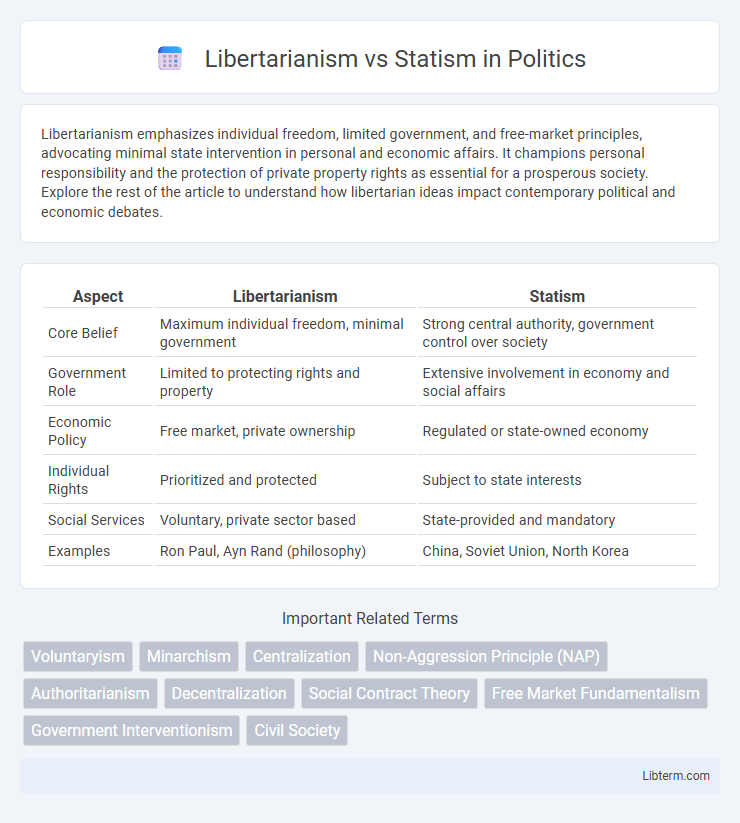Libertarianism emphasizes individual freedom, limited government, and free-market principles, advocating minimal state intervention in personal and economic affairs. It champions personal responsibility and the protection of private property rights as essential for a prosperous society. Explore the rest of the article to understand how libertarian ideas impact contemporary political and economic debates.
Table of Comparison
| Aspect | Libertarianism | Statism |
|---|---|---|
| Core Belief | Maximum individual freedom, minimal government | Strong central authority, government control over society |
| Government Role | Limited to protecting rights and property | Extensive involvement in economy and social affairs |
| Economic Policy | Free market, private ownership | Regulated or state-owned economy |
| Individual Rights | Prioritized and protected | Subject to state interests |
| Social Services | Voluntary, private sector based | State-provided and mandatory |
| Examples | Ron Paul, Ayn Rand (philosophy) | China, Soviet Union, North Korea |
Defining Libertarianism: Principles and Core Beliefs
Libertarianism emphasizes individual liberty, advocating minimal government intervention in personal and economic affairs to maximize personal freedom. Core beliefs include the protection of private property, voluntary exchange, and the right to self-ownership. This philosophy opposes extensive state control, promoting free markets and limited regulatory powers to uphold personal autonomy.
Understanding Statism: Key Concepts and Ideologies
Statism emphasizes the central role of the state in controlling economic and social policies to maintain order and promote collective goals. Key ideologies within statism include authoritarianism, where power is concentrated in a ruling elite, and welfare statism, which advocates extensive government intervention to provide social safety nets. Understanding statism involves recognizing its justification of state power as essential for social cohesion and national stability.
Historical Origins of Libertarianism and Statism
Libertarianism finds its roots in Enlightenment thinkers such as John Locke and Adam Smith, who championed individual liberty, private property, and limited government intervention. Statism, on the other hand, traces back to Hobbesian philosophy and the rise of absolutist monarchies, emphasizing centralized authority and state control to maintain order and security. The contrasting historical origins reflect fundamental differences in views on personal freedom and the role of government in society.
Individual Liberty vs. State Authority
Libertarianism champions individual liberty, emphasizing personal autonomy, limited government intervention, and the protection of private property rights. Statism supports state authority as essential for maintaining social order, enforcing laws, and providing public goods through centralized control. The core tension between these ideologies lies in balancing individual freedoms with the scope and power of government institutions.
Economic Freedom: Markets vs. Government Intervention
Libertarianism champions economic freedom, advocating for minimal government intervention and trusting free markets to regulate supply, demand, and innovation efficiently. Statism supports active government involvement in the economy through regulations, subsidies, and public ownership to address market failures and promote social welfare. The debate centers on whether market forces alone can ensure optimal resource allocation or if state control is necessary to manage equity and externalities.
Civil Liberties and Personal Autonomy
Libertarianism emphasizes maximizing individual civil liberties and personal autonomy, advocating for minimal government interference in private lives and freedoms. Statism supports a stronger governmental role, often prioritizing collective security and social order over unrestricted personal autonomy. The ongoing debate centers on balancing individual rights with state authority to ensure both freedom and societal stability.
Role of Government: Minimal State vs. Centralized Power
Libertarianism advocates for a minimal state, emphasizing individual freedom, limited government intervention, and protection of private property rights. Statism supports centralized power, endorsing a strong government role in economic regulation, social policies, and redistribution to maintain order and equality. The core conflict centers on the extent of governmental authority and its impact on personal autonomy and societal structure.
Societal Outcomes: Prosperity, Equality, and Justice
Libertarianism emphasizes individual freedom and limited government intervention, often leading to higher economic prosperity through free-market mechanisms but potentially increasing inequality due to reduced redistribution. Statism advocates for extensive government control to promote social welfare, aiming to enhance equality and justice by regulating wealth and providing public services, though this may constrain economic growth and innovation. Societal outcomes vary as libertarian policies favor economic liberty and merit-based achievement, while statist approaches prioritize social safety nets and equitable resource distribution.
Criticisms and Challenges of Libertarianism
Libertarianism faces criticism for its emphasis on minimal government, which opponents argue can lead to inadequate public services and social safety nets. Critics highlight challenges such as the potential for increased economic inequality and difficulties in regulating markets to prevent abuses without state intervention. Furthermore, libertarianism's reliance on individual responsibility is seen as problematic in addressing collective issues like environmental protection and public health.
Critiques and Limitations of Statism
Statism faces critiques for concentrating excessive power in government, which can limit individual freedoms and stifle economic innovation. Critics argue that centralized control often leads to bureaucratic inefficiencies, corruption, and a lack of responsiveness to citizens' needs. The limitations of statist policies are evident in reduced personal autonomy and the potential for government overreach, undermining democratic principles and market dynamics.
Libertarianism Infographic

 libterm.com
libterm.com